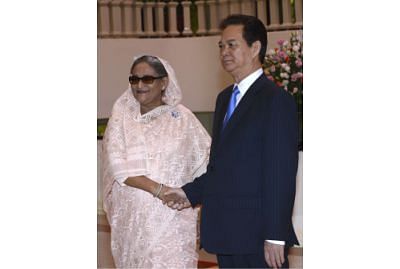PM's Vietnam visit opens up new opportunities

Photo: AFP
Bangladesh Prime Minister Sheikh Hasina visited Vietnam on November 2-4, preceding the Asia Europe Meeting (ASEM) Summit of heads of state/government in Laos.
That a business delegation accompanied the prime minister shows that the private sector is keenly interested in having collaborative or joint ventures with Vietnamese entrepreneurs.
Vietnam and Bangladesh achieved their independence through liberation war. Both war- ravaged countries had to go through an arduous process of rehabilitation of people and reconstruction of infrastructures including sea ports.
Bangladesh was the first South Asian and second Asian nation to establish relations with the provisional revolutionary government of South Vietnam at ambassadorial level in 1973.
North and South Vietnam were united as one country on April 30, 1975, when northern communist forces seized control of the US-backed South Vietnam. In 1982, Vietnam closed its embassy in Dhaka for financial reasons and reopened it in January 2003. Bangladesh opened its embassy in Hanoi in November 1993.
Bangladesh-Vietnam relations have been marked by several high level visits such the then Prime Minister Khaleda Zia's visit in 2005 and President Tran Duc Luong's in 2004. Both nations maintain good cooperation at international and regional levels.
In the past, Bangladesh and Vietnam had signed about a dozen bilateral agreements/MOUs on various issues but many of those have not been followed through. The bilateral trade, though modest, is progressing positively with an average growth rate of 20% per year
On the day of her arrival, the Bangladesh prime minister held a wide range of discussions relating to bilateral, regional and international issues of common interest with her counterpart Nguyen Tan Dung, and expressed her firm desire to continue strengthening bilateral relation and cooperation in a wide range of areas including economy, investment, agriculture, information, food security, communications, politics, security and defense.
Mentioning that Bangladesh has immense opportunities for business, Prime Minister Hasina invited Vietnamese investors and media to visit Bangladesh to see the country's overall progress and its potential to become a regional economic hub.
In reply, the Vietnamese prime minister said: "We've found directions for improvement of relations and cooperation between the two countries in politics, diplomacy, security, economy, trade, investment, agriculture, information and communication, culture, tourism and a few other areas."
He said the foreign ministries of the two countries would start discussions and organise the first ever political level consultation next year to cement bilateral relations and exchange views on regional and international issues of common concern.
Later, Bangladesh and Vietnam signed two agreements and two Memoranda of Understanding (MoU) in the fields of fisheries and livestock, agriculture and trade, and to establish Business Councils in both the countries. Sheikh Hasina and Nguyen Tan Dung witnessed the signing of agreements and MoUs.
Of the two agreements signed by the two countries, one related to the extension of the MoU between Bangladesh and Vietnam on cooperation in the field of agriculture signed on March 22, 2004, in Dhaka.
Another agreement was signed on cooperation in establishment of the Bangladesh-Vietnam Business Council between the Federation of Bangladesh Chambers of Commerce & Industry (FBCCI) and the Vietnam Chamber of Commerce and Industry (VCCI). FBCCI president A.K. Azad and VCCI President Vu Tien Loc signed the agreement on behalf of their respective sides.
Of the remaining two MoUs, one was signed in the field of fisheries and livestock
by the two ministries and another MoU was signed on trade promotion between the Vietnam Trade Promotion Agency and the Export Promotion Bureau of Bangladesh.
Vietnam's economic transformation results in large part from a policy initiated twenty years ago with liberalisation of the economy, even as the country remained under one-party communist rule. Vietnam's economic boom dates to 1995, when Hanoi normalised relations with the United States and joined the Association of Southeast Asian Nations (Asean).
The flourishing economy has dramatically improved life expectancy of 86 million people, and the poverty rate dropped by almost two-thirds between 1993 and 2004. (GDP per head: approx. $1,174 as of 2012.)
Apart from making shoes and apparel, manufacturing of electronic goods is on the rise because of large investments from companies such as Intel and Canon, of which the latter has built the world's largest laser printer factory in northern Vietnam. The result is a growing number of high-end goods. The top investors are Japan, Taiwan, Korea and Singapore.
There are over 100 UK companies with registered offices in Vietnam. The value of UK investments across a range of sectors was approximately $ 2.6 billion in 2011.
With the normalisation of diplomatic relations in 1995, the US and Vietnam exchanged ambassadors in May 1997. Washington and Hanoi have been cozying up in a number of areas of mutual interests. The US is Vietnam's top export market and America is the country's number one foreign investor. Two-way trade .reached over $22 billion in 2011 with Vietnam exports standing at $17. 5 billion and imports from the US at $4.5 billion.
Due to slowdown of global economy, Vietnam's Prime Minister Nguyen Tan Dung predicted growth of 5.5% this fiscal year, with inflation at 8%, and pledged to push forward with difficult structural reforms. Investors maintain that Vietnam's long term prospects are good, provided that the government sticks to its reform plans, and overcomes skills shortage and infrastructure challenges.
Bangladesh and Vietnam can work together in many areas of mutual interest. The visit of our prime minister has opened up new opportunities for both countries to boost economic, social and cultural ties. It also reflects strengthening of Bangladesh as a bridge between South Asia and South East Asia.

 For all latest news, follow The Daily Star's Google News channel.
For all latest news, follow The Daily Star's Google News channel. 



Comments